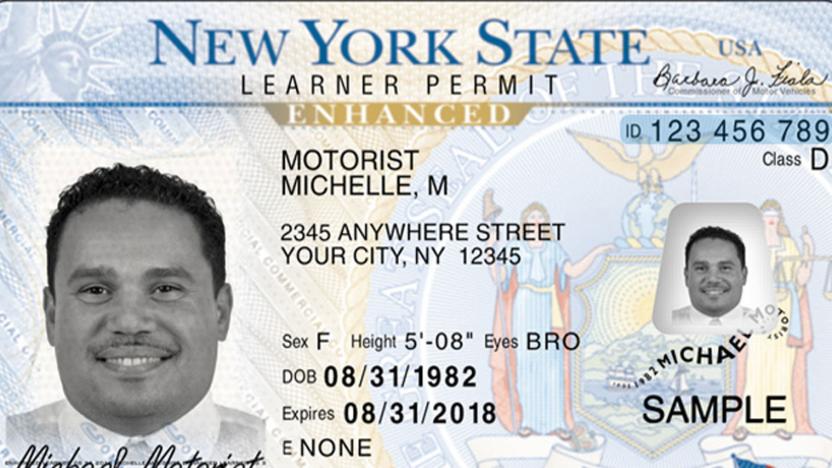idcard
Latest

New York's smarter face recognition catches more ID thieves
Sometimes, behind-the-scenes tech upgrades can make a big difference. New York's Governor Cuomo reports that an overhaul of the state DMV's face recognition software in January has led to more than 100 arrests and 900 open investigations so far. The trick? The new system checks 128 points on a face instead of 64, dramatically increasing the chances that it'll match a photo against the DMV's database. Combine that with new comparison modes (like black-and-white and overlays) and it's easier to catch identity thieves and fraudsters, such as one man who tried to get a license with a stolen identity in order to evade a suspension.

Afghanistan moves ahead with plans for national electronic ID cards
It doesn't appear to involve the biometric IDs that were first proposed by NATO, but the Afghanistan government has just announced plans to issue electronic ID cards to everyone in the country -- an undertaking that it hopes will be complete in five years. That admittedly difficult effort got off to an official start today with the signing of a $101.5 million contract with Afghan company Grand Technology Resources, which will apparently be responsible for producing the wallet-sized cards themselves. In addition to the usual identification, those will each contain a chip that stores the individual's drivers license, vehicle registration, signature and voting registration records -- the latter of which is particularly key, as one of the main reasons for the cards existence is to ensure "fairer, more transparent and efficient" elections in the future.

Germany slapping RFID tags on its populace for the sake of brisker bureaucracy
ID cards and RFID tags are similar in one key respect: they get a lot of bad press -- one for constricting civil liberties, the other for being a lousy security risk -- and yet are widely used around the world. It's fitting, therefore, that Germany has decided to marry the two for the latest version of its own personalausweis. Dutch company NXP has begun production of the requisite RFID chips for these new slices of plastic, which will roll out from the beginning of November this year. The Deutsch state sees a vastly expanded role for the modernized cards, including validating your identity for online shopping and communicating with your local authority (e-government, they call it). And, of course, your biometric data is loaded onto the chip as well, just to make things nice and neat. You know, we remember the good old days when identity theft used to be hard.

GE Global Research holograms increase security, redefine 'going green'
GE Global Research in collaboration with SABIC Innovative Plastics has developed a new class of holographic materials that can be processed in plastic to create a wide range of novelty products, credit, or identity cards. Instead of just being stamped onto the surface of the card like typical holograms, these new cards rely upon thermo-plastic based volume holography to store the data (binary images, 3D images of your face, fingerprints, and even animations) within the card itself for an extra degree of tamper-free security. And because the holographic material can be injection-molded, it could ultimately be applied to a variety of personalized products including laptops and cellphones. GE Global Research is intent on commercializing the new holographic materials by 2012, until then we've got a video that gives a good idea of how your 3D mug might look pressed into those government or corporate mandated ID cards of the future. Check it after the break. %Gallery-78893%

China outdoes itself with unprecedented surveillance initiative
The Chinese government, long-renowned for its tolerance, unobtrusive law-making, and general good vibes, has announced plans to begin outfitting its citizens with a new kind of ID card; one with an embedded chip that will include the holder's name, address, work history, educational background, religion, ethnicity, police record, medical insurance status and landlord's phone number. The cards will also carry reproductive history information, to further aid authorities in enforcing China's "one child" policy. Ostensibly, the cards will keep track of the large influx of peasants moving to cities, though Michael Lin, VP of China Public Security Technology, went on (in Orwellian fashion) to say; "If they do not get the permanent card, they cannot live here, they cannot get government benefits, and that is a way for the government to control the population in the future." Additionally, authorities are aggressively installing new security cameras around cities like Shenzhen, which utilize sophisticated recognition software co-developed by US companies like IBM, HP, and Dell. When reached for comment at the Ministry of Truth, the Chinese version of Big Brother was unavailable, as he was busy rationing out Soylent Green, Soma, and Ludovico technique treatments.[Via Techmeme]

